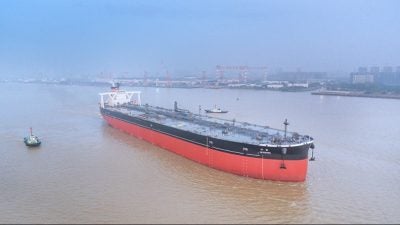
Japanese shipping firm Nippon Yusen Kabushiki Kaisha (NYK) Line has taken delivery of a very large crude oil carrier (VLCC) named Tateshina.
Tateshina was constructed at China’s Nantong COSCO KHI Engineering (NACKS).
The newbuild has an overall length of 339.5m, breadth of 60m and depth of 28.9m.
Tateshina features a gross tonnage of 162,218t and deadweight tonnage of 311,979t.
The new vessel will sail under the flag of Liberia.
In addition to improvements in propulsion performance, the shape of the vessel’s bow has been enhanced to cause less wave-making resistance.
Tateshina is loaded with energy-saving features, including large-diameter propellers, low-friction paint applied to the hull, and ladder fins for managing energy loss and regulating the flow of water at the stern.
Compared with conventional VLCCs, the vessel’s energy efficiency, measured in CO₂ emissions per unit of transportation, is nearly 23% higher, fulfilling the International Maritime Organization (IMO) phase two energy efficiency design index (EEDI) requirements.
Furthermore, Tateshina has received the Cyber Resilience-Guideline (CybR-G) notation from the Japanese classification society ClassNK.
The notation recognises the viability of the design for effective vessel operation with cybersecurity factored in.
This marks the first such cyber notation grant for a ship in line with the ClassNK’s Guidelines for Designing Cyber Security Onboard Ships.
In a statement, NYK Line said: “The NYK Group considers safety to be of utmost importance and will continue to take countermeasures against threats such as cyberattacks on ships to contribute to stable crude oil transportation to meet customers’ demands.”
In September, NYK Line entered into a memorandum of understanding with Itochu Enex, Kyushu Electric Power Company and Saibu Gas to partner on the delivery of liquefied natural gas as a marine fuel for ships in western Japan.



